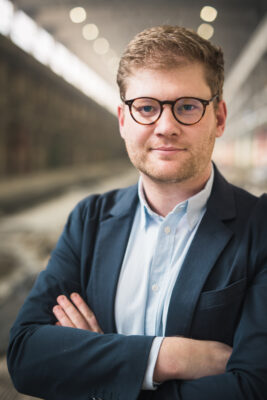Having a dedicated team of specialists with engineering experience in the field of prefabrication as well as scientific knowledge and research skills is a kind of novelty in the Polish construction industry. Although dynamically evolving we must face up to the real opinion of our still significant technological distance to highly developed countries. In addition, the rising prices of services and building materials, as well as care for the natural environment and high customer expectations, are becoming additional catalysts for innovative development activities.We invite you to read the article published in No. 5/2022 “Builder Science”
 Dr. Eng. Mateusz Surma, R&D Designer, Pekabex Group
Dr. Eng. Mateusz Surma, R&D Designer, Pekabex Group
As the Pekabex Group, we shorten this distance. In 2017, we received funding from the Ministry of Development and Finance under the POIR 2014-2020 Program for the implementation of the project entitled „Establishment of the Research and Development Center”. The aim was to initiate the building of the structure and the opening of internal R&D activities. The activities of the R&D unit carried out in the Pekabex Group can be classified in several areas.
Firstly, it is about the verification of the material and construction parameters of the implemented products, confirmed by appropriate certificates of independent entities. In order to ensure the highest safety requirements and the comfort of using the facilities, a number of tests are made of prefabricated elements to verify the initial assumptions, before implementation into continuous production or in response to the existing situation in production, assembly and use. Numerical analyzes as well as empirical tests should be indicated here.
Secondly, we strive to automate production and implement advanced calculation methods that allow us to optimize and develop the existing precast concrete elements, as well as the range of steel connectors for shaping their connections. The know-how developed in this way enables us to offer on the domestic and foreign market not only separate structural elements, but also system prefabricated buildings, e.g. frame-structure halls and modular multi- and single-family buildings with panel construction. Work on the components of these systems also includes a pro-environmental aspect, i.e. reducing the dimensions of the elements, reducing the consumption of Portland cement by using its lower grades, attempts to partially replace the reinforcing steel with materials based on reinforced FRP composites, reducing the consumption of structural steel in the proprietary column connectors closely matched to the system, marks, lengths of bars. R&D activities on the way to maximum efficiency of solutions require the use of elements of modern design techniques in the design, research and implementation phase, i.e. DFA (design for assembly), DFM (design for manufacturing), or design thinking in order to reduce the labor intensity of the design departments production or assembly.
The last area I would like to mention are author’s (proprietary) solutions. The need and recognition of this type of activities is evidenced by, for example, obtaining a grant from the Polish National Center for Research and Development in 2021. Research and development works concern the development of an innovative prefabricated bathroom module, together with its production technology, intended for housing, public utility and part of administrative and office buildings industrial. Bathroom modules will complement the assortment of Pekabex construction elements in the aforementioned areas and will bring a number of advantages and benefits for recipients, such as shortening the investment time. New knowledge is created in the project: a dedicated lightweight concrete mix, a self-supporting module structure and a new production technology.




